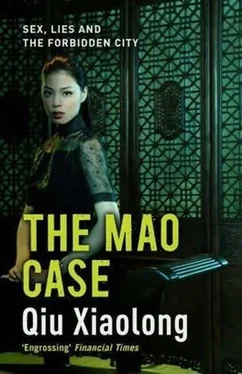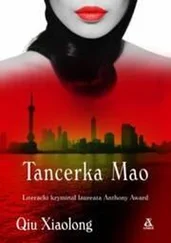“Mao said that the Chinese people, every one of them, should be soldiers. The picture embodied such a heroic spirit. The poem was a great inspiration to people in the sixties.”
“But have you heard about the background of it – about the identity of the militia woman in the poem?”
“Well, some stories shouldn’t be taken too seriously.”
“From what I’ve heard, Long, Mao wrote the poem to please that militia woman.”
“No, that’s nothing but hearsay. Give me a poem – any poem you choose – and I could claim that it was written for someone and come up with a far-fetched story.”
“But it was in an official newspaper – the identity of the militia woman, I mean.”
“I’m sorry that I cannot help you,” Long said with hesitation, visibly troubled, looking over his shoulder. “Oh, the crabs are getting cold. Let’s steam more fresh ones.”
“Good idea.”
While Long was busy putting more crabs into the steamer, Chen sized up the situation. His approach had proved to be too abrupt. In spite of his offer of the crabs and the book project, Long remained unwilling to reveal details of Mao’s private life to a cop.
So Chief Inspector Chen had no choice but to play his trump card. For the Mao Case, such means were justified.
When Long returned to the table with another platter of steaming hot crabs, Chen resumed speaking in a more serious tone, “Now, I have to tell you something from the Writers’ Association.”
“Oh yes, you’re an executive member.”
“People want to carry out reforms to the system of professional writers. Because of the government funding cuts, you know, some changes may be inevitable.”
That change was barely relevant to Chen, who had his regular income from the police department, but for a number of professional writers like Long, it would be crucial. And it would be hard for them to find another job in the current, highly competitive market.
“What have you heard?”
“To be fair to the professional writer system,” Chen said, unraveling the thread around a crab, “the change has its merits. We have to take into consideration the special circumstances of each writer. For some, with their bestsellers, they don’t need any money from the association. But for some, whose work requires a lot of research, the ‘professional writer pay’ is still necessary, even more so in today’s society. I made a point of it at the meeting.”
“What did others say?”
“They made a point about publication. After all, people may say a lot about their own works, but there has to be a criterion. So it will come to vote in a special committee.”
“And you’re on the committee?”
“Yes, I am, but I think the odds are against me. Now,” Chen paused to crack the crab claw with his fist, repeatedly, on the table, “with this new English translation, and with you being the Chinese advisor for the book, I can definitely say something on your behalf. And on mine, too.”
“Yours?” Long cut in. “You’re not even a professional writer, are you?”
“Some people have been saying that I’m interested only in Western modernism. That’s untrue. I have translated a number of classical Chinese poems. And a collection of Mao’s poetry may speak volumes for me.”
That sounded like a convincing motive to Long, who nodded, having heard comments about Chen’s controversial work.
“With your publication both here and abroad,” Chen went on, “I don’t think anyone could vote against you.”
“Chief Inspector Chen, I appreciate your support, and I admire your passion for Mao’s work,” Long said, raising the cup slowly. “Your insistence on a reliable and objective translation speaks for your integrity.”
Chen waited for Long to continue. What made the difference was the threat to his “professional writer” status. Without Chen’s support, his case was hopeless.
A short silence ensued, broken only by the noise made by the crabs still crowding and crawling at the bottom of the plastic basin, blowing bubbles.
“Back to your questions, Chief Inspector Chen,” Long resumed. “I’ve gathered some information that didn’t come from proper research. It is more or less hearsay, you know. But as a responsible translator, you surely know how to select and judge.”
“Of course I’ll have to do that,” Chen said, seeing this as a necessary step for Long to distance himself from the information. “I will take full responsibility for the translation.”
“Now, about the identity of the militia woman, where did you read this?”
“In a Beijing newspaper. According to the article, Mao wrote the poem for a phone operator in the Central South Sea. She took a picture of herself in a militia woman’s costume and showed the photograph to Mao. But how could that have happened? An ordinary phone operator wouldn’t have been able to get close to Mao.”
“Exactly,” Long said, crunching a crab leg forcibly. “There are actually several different versions of the story behind the poem. It’s no secret that Mao had a number of dancing partners. In addition to those ensemble girls, his partners also included those working for him, like the waitresses in the special train, the special nurses, and the phone operators. In one version, a special nurse instead of the phone operator showed the picture to Mao, who wrote the poem to show his appreciation.”
“So what are some of the other versions?”
“Well, have you heard of a movie actress named Shang?”
“Yes, what about her?” Chen said, immediately alert.
“She, too, danced with Mao. The poem was said to be for the actress who played a militia woman in a movie. I saw the movie for that very reason and Shang won an award for her performance. But how reliable is the story about her being the inspiration? I don’t know. Stories about Mao are often blown out of proportion. Anyway, there’s no ‘final word’ about the identity of the militia woman.”
“Can you go into more details here? About Shang, I mean.”
“She’s quite well-known, called ‘the phoenix of the movie industry.’ There’s a Beijing opera called Dragon Flirting with Phoenix. Have you seen it?”
“Yes, it’s about a Ming emperor’s romantic affair with Sister Phoenix.”
“In traditional Chinese culture, the dragon symbolizes the emperor, and the phoenix, its female partner.”
“I see.” Whether Mao believed in such an interpretation, consequently falling for Shang, Chen didn’t know, but he understood the roundabout way in which Long responded to his inquiry.
“That also could be related to the poem for Madam Mao too,” Long went on, finishing the cup in one gulp. “In another, more elaborate version, Madam Mao knew the origin of the militia-woman poem, so she asked Mao to write one for her picture as well – for balance of imperial favor, or like in the old saying, ‘to share the favor of the divine rain and dew.’ Mao came to Shanghai so many times… By the way, have you read the book Cloud and Rain in Shanghai?”
“Yes, I have.”
“So you know the story. With the background research I’ve done, I’m more inclined toward the supposition that Shang was the militia woman in the poem.”
“Why?”
“Mao actually copied poems for Shang. I interviewed a colleague of hers and, according to him, when he visited Shang’s place before the outbreak of the Cultural Revolution, he saw a scroll in Mao’s calligraphy in her bedroom.”
“The ‘Militia Woman’?”
“Not that one, but ‘Ode to the Plum Blossom.’ ”
“Really!” Chen had never thought about that poem in connection with the investigation. He took out a copy of Mao’s poems from his briefcase and turned to the ode.
Читать дальше












